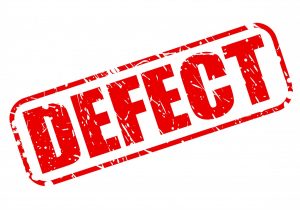Amazon Decides to Pay Claims for Product Defects
 Many of us who shop at Amazon are familiar with its benefits, such as One- or Two-Day Shipping and access to millions of products online. Some of us, unfortunately, are also familiar with the risk you take when ordering a product from Amazon, as what you see in the picture is not always necessarily what you get.
Many of us who shop at Amazon are familiar with its benefits, such as One- or Two-Day Shipping and access to millions of products online. Some of us, unfortunately, are also familiar with the risk you take when ordering a product from Amazon, as what you see in the picture is not always necessarily what you get.
The partnership between Amazon and third-party sellers has been viewed as both a blessing and a curse. For those who want to sell items with Amazon, it is certainly a blessing because sellers are given the opportunity to capitalize on the company’s leverage while distributing their products. In some aspects, however, it is a curse because when the products distributed through third-party sellers are defective, who is held liable?
Are there unsafe and unregulated products for sale on Amazon?
Amazon’s third-party marketplace has played a huge role in developing the company into the monumental ecommerce platform that it is today. However, third-party sellers are engaging in practices that can cost Amazon in the long run. Third-party sellers have been distributing unsafe and unregulated products to consumers.
Because a majority of third-party sellers are located overseas, tracking down the sellers of these products is difficult. Items like laptop batteries and bike helmets have caused serious injuries like burns and blindness. Some defective products have even resulted in the deaths of some consumers.
How has Amazon avoided liability for dangerous products?
Just like the exponential growth that Amazon experienced during the pandemic, the number of product liability cases against them is increasing as well. Unfortunately, Amazon has been trying to refrain from being held liable for any defective products that were sold by third-party sellers. In September of 2020, the company decided to settle with a customer who purchased a dog collar and was left blind in one eye as a result.
Because Amazon made the decision to settle the lawsuit instead of allowing it to go to trial, the Pennsylvania Supreme Court was exempt from ruling on whether Amazon should be held liable for defective products sold by third parties in the state of Pennsylvania.
A few days earlier, Amazon filed a petition requesting that the California Supreme Court review a ruling in the appeal of Bolger v. Amazon, another lawsuit by another customer. In this lawsuit, the judge ruled in favor of the plaintiff, claiming that the company can and could be liable for defective products in California. In October of 2020, the judge denied Amazon’s petition. The plaintiff’s lawyers also drew attention to the fact that California’s ruling is the only precedent in the country that holds Amazon liable for the defective products sold on its website.
What is Amazon’s change in policy?
This month, Amazon announced its intentions to update its A-to-Z Guarantee Claims Page. The updates to the policy page include payments to customers for claims up to $1,000 in the event a defective product was the cause of property damage or personal injury for the customer. Beginning in September, Amazon plans to expedite the resolution of claims and create a better overall shopping experience for the consumer.
What prompted this policy change?
It is evident by Amazon’s actions in their two lawsuits that they did not want to be held liable for any defective products sold by their third-party sellers. If that is the case, why the sudden change of heart? Part of this renewed sense of accountability on Amazon’s part may stem from their most recent lawsuit involving the U.S. Consumer Product Safety Commission.
In July of 2021, the independent agency sued Amazon and forced the company to recall several products that could cause severe harm to consumers. These products included defective carbon monoxide detectors, children’s sleepwear that failed to meet the flammable fabric safety standard, and hair dryers that were capable of causing shock and electrocution.
Another potential reason for the sudden change in policy is the pressure placed on the company to supervise their third-party marketplace. Gradually, Amazon has succumbed to that pressure by incorporating small changes, such as the new requirement for U.S. sellers. All U.S. sellers are required to display their contact information, a requirement that was previously limited to sellers from Europe, Japan, and Mexico. Some experts view this policy change as another way for Amazon to play a more active role in the transactions between their third-party sellers and their consumers.
The offer of retail-like insurance
In addition to the policy update, Amazon has also decided to provide an incentive for third-party sellers to take advantage of what is known as the “insurance accelerator.” This procedure is offered to third-party sellers as a way to help sellers find liability insurance. According to Amazon, third-party sellers who hold valid insurance and abide by the policies will not be sought after for reimbursement for customer payouts.
Should we trust Amazon’s policy change regarding defective products?
Some third-party sellers are cautiously optimistic about Amazon’s new policy changes, with good reason. Amazon has taken a hands-off approach to product liability cases until this year. Although these policy changes seem like a step in the right direction, the changes could also be used to offset any additional problems the company is facing.
For example, some customers still purchase products from third-party sellers without realizing that they are purchasing from the third-party seller and not Amazon. By becoming more hands-on in the transactions between third-party sellers and consumers, Amazon can keep better tabs on potential fraudulent returns.
Some third-party sellers just hope that the policy changes are beneficial for both the seller and the consumer. While Amazon is taking ownership and enforcing insurance requirements for sellers, these are requirements that the retail industry already practices and should have been enforced from the beginning. Other third-party sellers believe that Amazon needs to do more investigating into the safety precautions third-party sellers use to manufacture their products. Time will tell how these policies impact Amazon moving forward.
If you or a loved one has been injured by a defective product sold by Amazon or any other retailer, help is available. You can put your trust in the experienced Mississippi product liability attorneys at Merkel & Cocke, P.A. to fight for your right to compensation. We have offices in Jackson, Clarksdale, Greenville, and Oxford we serve and also assist injured clients throughout Mississippi. Call us at 662-627-9641, or complete a contact form to schedule a free consultation.

After graduating from the University of Virginia Law School in 1975, Mr. Cocke and Mr. Merkel established Merkel & Cocke, P.A. in 1982. Since that time the emphasis of Mr. Cocke’s practice has progressed toward medical malpractice. At the present time his practice is exclusively devoted to handling medical negligence cases for the plaintiff, either as a result of direct contact by the client or on referral from other attorneys who are not familiar with the handling of medical negligence cases. Mr. Cocke was selected Best Lawyer of the year for 2012 and 2014 in The Memphis area in the field of Medical Malpractice and has been selected a Best Lawyer and Super Lawyer every year since 2006. Learn more about John Hartwell Cocke here.
